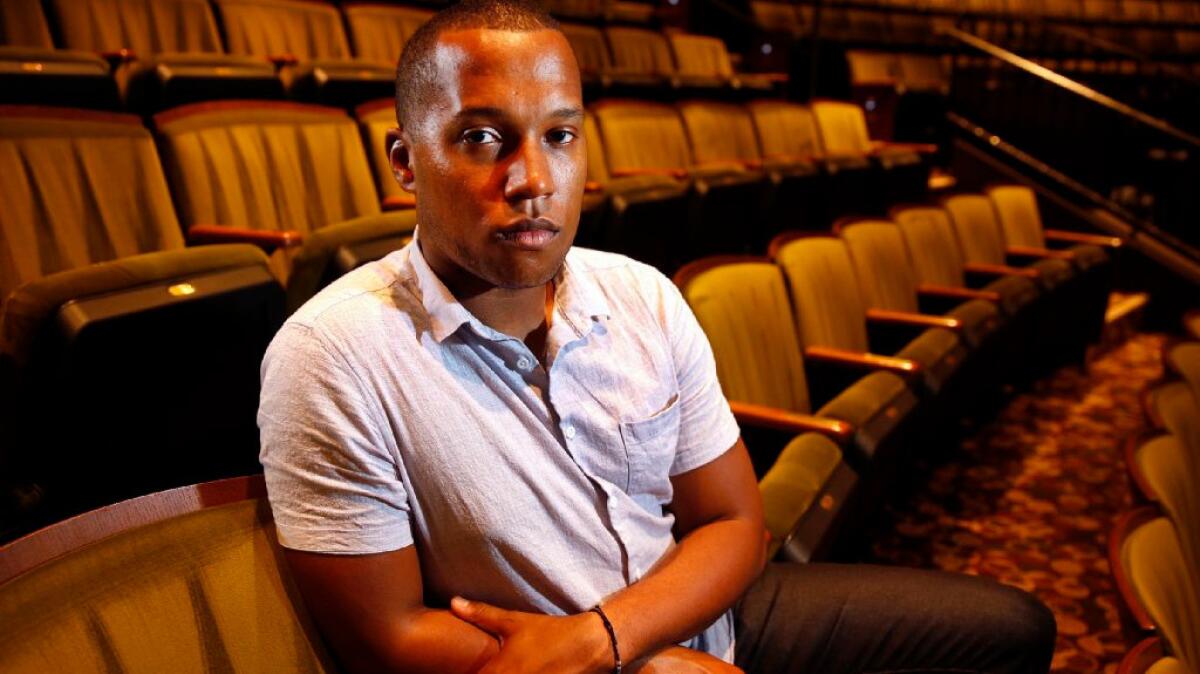Why a MacArthur Foundation grant for playwright Branden Jacobs-Jenkins, 31, is no surprise at all

- Share via
Los Angeles Times theater critic Charles McNulty has written that we’re enjoying “one of the most exciting periods in American playwriting in at least a generation,” one in which “a cadre of trailblazing talents has emerged.” Now one of those ascending stars, 31-year-old playwright Branden Jacobs-Jenkins, has been named a 2016 MacArthur Foundation Fellow.
The MacArthur Foundation grants — 23 were announced Wednesday night — go to individuals in a range of fields, including writers, artists, scientists, teachers and entrepreneurs. Recipients this year each will receive a $625,000, no-strings-attached grant that theoretically will help to develop future work.
Jacobs-Jenkins’ work delves into race, class, family and identity while mining both contemporary and historical theatrical genres. “Although the provocation of his audience is purposeful,” the MacArthur Foundation said of his often satirical plays, “Jacobs-Jenkins’s creation of unsettling, shocking, often confrontational moments is not gratuitous; these elements are of a piece with the world he has established on stage and in the service of the story he is telling.”
His 2012 play “Appropriate,” a drama set in Arkansas about estranged siblings who are reunited after the family’s patriarch passes away, explores racial relationships after a collection of lynching photographs is found. McNulty called the 2015 production at L.A.’s Mark Taper Forum a “highly charged and ambitiously sprawling drama.”
The 2010 play “Neighbors,” in which actors in blackface reference historical minstrel acts, was produced that year at the Matrix Theatre in L.A. “Appropriate” and 2014’s “An Octoroon,” the latter of which explores legacies of slavery, jointly received the 2014 Obie Award for best new American play. (In an interview with the L.A. Times last year, when asked how he was handling the resulting media attention, Jacobs-Jenkins responded: “I actually don’t read the press. All the writers I admire were significantly reclusive, and I’m still trying to figure out how they got to a place where they didn’t have to talk to press.”)
This year, Jacobs-Jenkins won Yale University’s 2016 Windham-Campbell Prize, presented for fiction, nonfiction and drama.

In a MacArthur video, Jacobs-Jenkins says he sees theater as a space to safely explore ugly feelings like fear and disgust.
“All of my work is sort of fed by a question, a need to understand the world and why the world is what it is,” he says.
No wonder, McNulty writes, this is “perhaps the most revolutionary moment in American playwriting since Sam Shepard, Maria Irene Fornes and Adrienne Kennedy began reinventing the dramatic wheel in the 1960s.”
Follow me on Twitter: @debvankin
Kanye West’s famous ‘Famous’ sculpture is not for sale, gallery says
Doug Aitken’s ‘Electric Earth’ will shake the MOCA landscape
The Broad announces its first visiting special exhibit: ‘Yayoi Kusama: Infinity Mirrors’
More to Read
The biggest entertainment stories
Get our big stories about Hollywood, film, television, music, arts, culture and more right in your inbox as soon as they publish.
You may occasionally receive promotional content from the Los Angeles Times.











